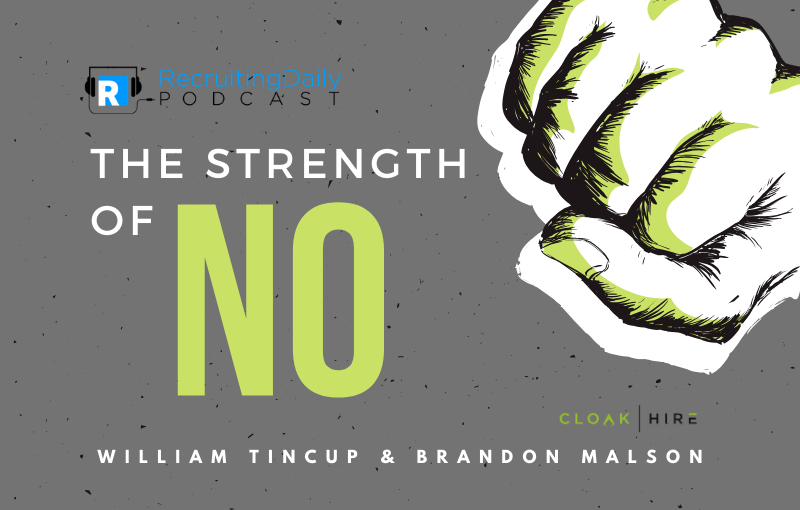Base your entire business off the strategy of “go for no.”
What? Really?
Most people don’t like to be sold to, but they do like to buy. (Think about Amazon’s revenue, right?) So let’s say you approach a prospect and list everything that’s great and amazing about your company or offer. This is how most salespeople, and many recruiters, approach their role.
They go HAM on features/benefits and maybe their tech, right?
We’ve all seen this.
Well, that approach is inherently selling to someone, and the prospect knows it.
They are being directly sold to with a list of how great everything is and will be if you spend this money.
Now flip the script and sit down with a prospect.
Instead of “We are so great!” let’s do a list of reasons why we shouldn’t work together. Most in sales would lose it thinking of this approach because they’ve got a quota to make and want to feed their families.
But if you work through an entire list of “NO” and turn each “NO” into a “Maybe/Yes,” well, now the prospect is intrigued. Because all the objections — the “NOs” — have been met and conquered.
This is a little bit Challenger Sales approach and Sandler Training, sure, but it also can be turned into your own strategy with the right use of tone.
Let’s be clear, exploring NOs and confirming that the outcome should be a NO is a perfectly acceptable outcome.
Even a great timesaver instead of filling your pipeline with a bunch of MAYBEs that will never turn into YESs (YES’) anyway.
This is a much better approach to get truth and clarity for your pipeline than using the old, “Well, let me demo you these 12 talking points that I’ve been using on everyone for 2.7 years…”
Why is it so hard to say no?
Lots of reasons, including a belief that it’s not PC, it’s a sign of weakness, it means you’re not dependable, etc. Fear of conflict is another big one.
If you’re in sales, you’re often afraid that saying “no” means the deal is dead, and if the deal is dead, your numbers are lower. You don’t want to disappoint, right? Of course.
What many fail to realize, though, is that when they say “yes” to everything, the teams that actually have to execute on the “yes” — turn lemons into lemonade, if you will — get really burned out.
A lot of turnover and churn in companies come from too many “yes” answers and not enough “no” answers.
Don’t believe us? OK.
Steve Jobs, who admittedly is quoted in way too many business articles and was not the best person but did build a massive, awe-inspiring brand, often said the most important thing in his arsenal was saying no. (Warren Buffett, who also gets mentioned in too many business articles but is very successful, has said to focus on the “slow yes and the quick no” as well.)
And actually, on the Apple front … around the same time we recorded this podcast, The Wall Street Journal did a deep-dive on Tony Blevins, an Apple procurement executive.
Blevins might be as important to Apple as Tim Cook in some respects.
What is Blevins’ job? He basically talks to suppliers and drives the input cost down.
In other words, he says “No” all the time and keeps Apple profitable and rolling. See the importance of “no” herein?
“I need a napkin and a pen!”
The great story around the 33-minute mark of this podcast about the deal you absolutely want and need to close on the spot. We’ve all had those, right? But sometimes the nuance is in the “no.”
And of course, we follow Brandon’s story with a “top of price” story on the technical talent that involves billiards and bourbon. Yes, it’s relevant – “No” is still the through-line of that story.
Overall, a very interesting reverse-strategy kind of work in this audio.
It’s about 43 minutes, or two average U.S. commutes (to work and back).
Give it a whirl.
Authors
William Tincup
William is the President & Editor-at-Large of RecruitingDaily. At the intersection of HR and technology, he’s a writer, speaker, advisor, consultant, investor, storyteller & teacher. He's been writing about HR and Recruiting related issues for longer than he cares to disclose. William serves on the Board of Advisors / Board of Directors for 20+ HR technology startups. William is a graduate of the University of Alabama at Birmingham with a BA in Art History. He also earned an MA in American Indian Studies from the University of Arizona and an MBA from Case Western Reserve University.



Discussion
Please log in to post comments.
Login